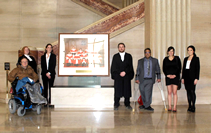Act Now

Empower U: Learn to Access Your Disability Rights Training on Canadian Human Rights, the Convention on the Rights of Persons with Disabilities (CRPD) and its Optional Protocol (OP) training aims to increase awareness of how to address discrimination using more familiar Canadian human rights laws such as Human Rights Codes and the newer international Convention on the Rights of Persons with Disabilities (CRPD). This is training for persons with disabilities by persons with disabilities. The training is part of a project funded by Employment and Social Development Canada and implemented by the Council of Canadians with Disabilities (CCD) in collaboration with Canadian Multicultural Disability Centre Inc. (CMDCI), Citizens With Disabilities – Ontario (CWDO), Manitoba League of Persons with Disabilities (MLPD) and National Educational Association of Disabled Students (NEADS). Read more.
Sign Up for our monthly digest
A monthly newsletter from CCD about what is happening in the community
Canadian Human Rights Tribunal Decision Safeguards Access on Voting Day
Related Documents
September 17, 2021
What Are Canada's Political Parties Plans Concerning Inclusive Emergency Preparedness?
September 15, 2021
CCD Seeking an Accessible and Inclusive Post-COVID-19 World: No New Barriers!
September 13, 2021
CCD Seeks Commitments on Accessible and Affordable Housing
12 February 2010
For Immediate Release
On 17 March 2008, due to inaccessibility at the St. Basil's Church polling station, Peter Hughes, a voter with a physical disability, had to go down a set of stairs "on the seat of his pants" in order to cast his ballot in a federal by-election. Once again on 14 October 2008, the general election, he experienced barriers at the St. Basil's polling station, located in the downtown riding of Toronto Centre. Mr. Hughes made a complaint to the Canadian Human Rights Commission against Elections Canada about the barriers he encountered. The Canadian Human Rights Tribunal granted Interested Party status to the Council of Canadians with Disabilities (CCD), a human rights organization covering a wide spectrum of disabilities. CCD shared with the Tribunal its views on remedies that would benefit voters with disabilities in future elections.
In James Peter Hughes and Canadian Human Rights Commission and Elections Canada and Council of Canadians with Disabilities, the Canadian Human Rights Tribunal ordered Elections Canada to "cease from situating polling stations in locations that do not provide barrier-free access". "CCD regards this decision as a victory, because the Tribunal's order compels Elections Canada to keep access considerations front and centre as it conducts elections," states Marie White, CCD Chairperson. Additionally, the Tribunal ordered Elections Canada to alter a number of its practices related to consultation, leasing, policies and guidelines, signage, and training. For example, Elections Canada has been ordered to revise "its standard lease for polling stations to include the requirement that the leased premises provide level access and are barrier-free". The Tribunal also ordered Elections Canada to implement "a process for receiving, recording and processing verbal and written complaints about lack of accessibility." The number of complaints received about accessibility will be publicly reported via Elections Canada's CEO's post-election report to Parliament. "In addition to training, monitoring elections and evaluating accessibility outcomes are critical," states Jim Derksen, a member of the CCD Human Rights Committee.
-30-
For More Information Contact:
Jim Derksen, CCD Human Rights Committee Member, Cell: 204-781-4187
Laurie Beachell, CCD National Coordinator, Cell: 204-981-6179
Yvonne Peters, CCD Human Rights Committee Lawyer, Tel: 204-832-0681

Some members of the CCD team at the Supreme Court of Canada on April 25, 2018 to intervene in S.A. v. Metro Vancouver Housing Corporation. (L. to R. Bob Brown, CCD Human Rights Committee member, Dianne Wintermute, legal counsel (ARCH), Dahlia James, a second year JD candidate at U. of Ottawa and Prof. Ravi Malhotra’s Research Assistant and Luke Reid, legal counsel (ARCH) , and Prof. Ravi Malhotra, a member of the Human Rights Committee, Prof. Anne Levesque, Chair of the Human Rights Committee, and Erin Carr, a second year JD candidate.
The Latimer Case
The Latimer case directly concerned the rights of persons with disabilities. Mr. Latimer's view was that a parent has the right to kill a child with a disability if that parent decides the child's quality of life no longer warrants its continuation. CCD explained to the court and to the public how that view threatens the lives of people with disabilities and is deeply offensive to fundamental constitutional values. Learn more.
